Luis Alberto Castillo: La máquina de hacer poesía [The poetry machine]
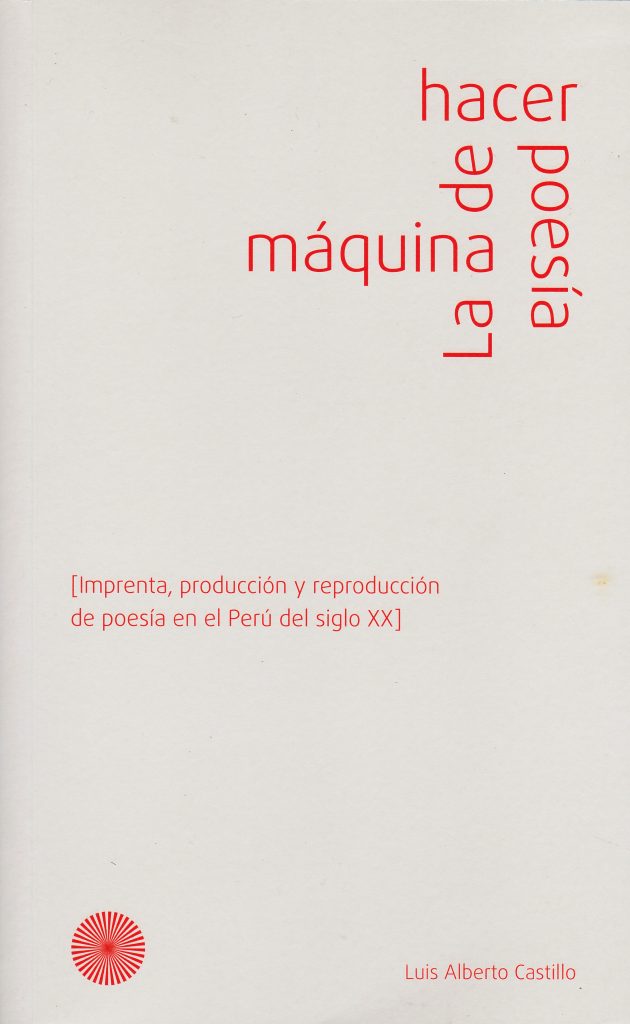 Published by Meier Ramírez, this book provides a very thorough understanding of all spaces of poetry. Luis Alberto Castillo, who is also Magazine Editor of Poetry and Critic on Pesapalabra and integrates the group Ánima Lisa, dabbles in new forms of poetic expression far from considering the digital resource as an adverse factor for the lyrical. On the contrary, Alberto Castillo considers that digitization expands the expressive possibilities as it represents a change towards a different universe. “With computers appears a possibility of splurge that has never been had before”.
Published by Meier Ramírez, this book provides a very thorough understanding of all spaces of poetry. Luis Alberto Castillo, who is also Magazine Editor of Poetry and Critic on Pesapalabra and integrates the group Ánima Lisa, dabbles in new forms of poetic expression far from considering the digital resource as an adverse factor for the lyrical. On the contrary, Alberto Castillo considers that digitization expands the expressive possibilities as it represents a change towards a different universe. “With computers appears a possibility of splurge that has never been had before”.
Javier Cercas: Terra Alta
 Javier Cercas was awarded the 2019 Planeta Award for his book Terra Alta, where a terrible crime shakes a peaceful region. Starting from this event, and through a fast-paced narrative full of memorable characters, the novel becomes a lucid reflection on the value of the law, the possibility of justice and the legitimacy of revenge. An epic of a man in search of his place in the world. The necessity to clarify the lies that were told at that time inspired him to write this precious novel.
Javier Cercas was awarded the 2019 Planeta Award for his book Terra Alta, where a terrible crime shakes a peaceful region. Starting from this event, and through a fast-paced narrative full of memorable characters, the novel becomes a lucid reflection on the value of the law, the possibility of justice and the legitimacy of revenge. An epic of a man in search of his place in the world. The necessity to clarify the lies that were told at that time inspired him to write this precious novel.
Hugo Chaparro Valderrama: Los elogios de la tribu [The tribe’s praise]
 Ricardo Torres’ literary legacy is one of the most valuable critical heritage by readers in the world. His writing continues to provide things to talk about even after his death, and his widow takes advantage of it to live like a duchess. Gondret and Tosoratti, two young journalists, meet Hernán Suárez Vallejo, the biggest collector of Torres’ books, who claims that the widow lies about her husband’s posthumous publications and is willing to prove it. The two women embark in an exciting journey in search of the truth behind the disappearance of one of the most important Argentine writers of all time.
Ricardo Torres’ literary legacy is one of the most valuable critical heritage by readers in the world. His writing continues to provide things to talk about even after his death, and his widow takes advantage of it to live like a duchess. Gondret and Tosoratti, two young journalists, meet Hernán Suárez Vallejo, the biggest collector of Torres’ books, who claims that the widow lies about her husband’s posthumous publications and is willing to prove it. The two women embark in an exciting journey in search of the truth behind the disappearance of one of the most important Argentine writers of all time.
Alberto Chimal: The Most Fragile Objects
 The Most Fragile Objects, Chimal’s first novel published in translation, tells three stories (maybe two, or just one) of people living secret lives in early 21st-century Mexico. They seem to indulge in wanton sex and power fantasies. But is everything what it appears to be? With a style that never resorts to titillation and a plot structure in which the factual and the dubious chase each other, The Most Fragile Objects, is an unusual, dark take on the themes of power, love, imagination, and freedom. Alberto Chimal is one of Mexico’s most prolific authors. His work encompasses a variety of genres and forms, including the novel, short story, essay, experimental fiction, and children’s literature. This interesting novel is translated from the Spanish by George Henson.
The Most Fragile Objects, Chimal’s first novel published in translation, tells three stories (maybe two, or just one) of people living secret lives in early 21st-century Mexico. They seem to indulge in wanton sex and power fantasies. But is everything what it appears to be? With a style that never resorts to titillation and a plot structure in which the factual and the dubious chase each other, The Most Fragile Objects, is an unusual, dark take on the themes of power, love, imagination, and freedom. Alberto Chimal is one of Mexico’s most prolific authors. His work encompasses a variety of genres and forms, including the novel, short story, essay, experimental fiction, and children’s literature. This interesting novel is translated from the Spanish by George Henson.
Teófilo Cid: La línea recta [The straight line]
 This anthology traces Cid clichés from the South: the natural landscape, human relations, friendship, with different dreamlike tints, characteristic of surrealism, as well as urban images, blurring, a nostalgic haze of elements that appear and disappear with nobility. He was part of the group La Madrágora, which in the words of Octavio Paz was the only truly surreal group in Latin America.
This anthology traces Cid clichés from the South: the natural landscape, human relations, friendship, with different dreamlike tints, characteristic of surrealism, as well as urban images, blurring, a nostalgic haze of elements that appear and disappear with nobility. He was part of the group La Madrágora, which in the words of Octavio Paz was the only truly surreal group in Latin America.
Mariana Enriquez: Nuestra parte de noche [Our share of night]
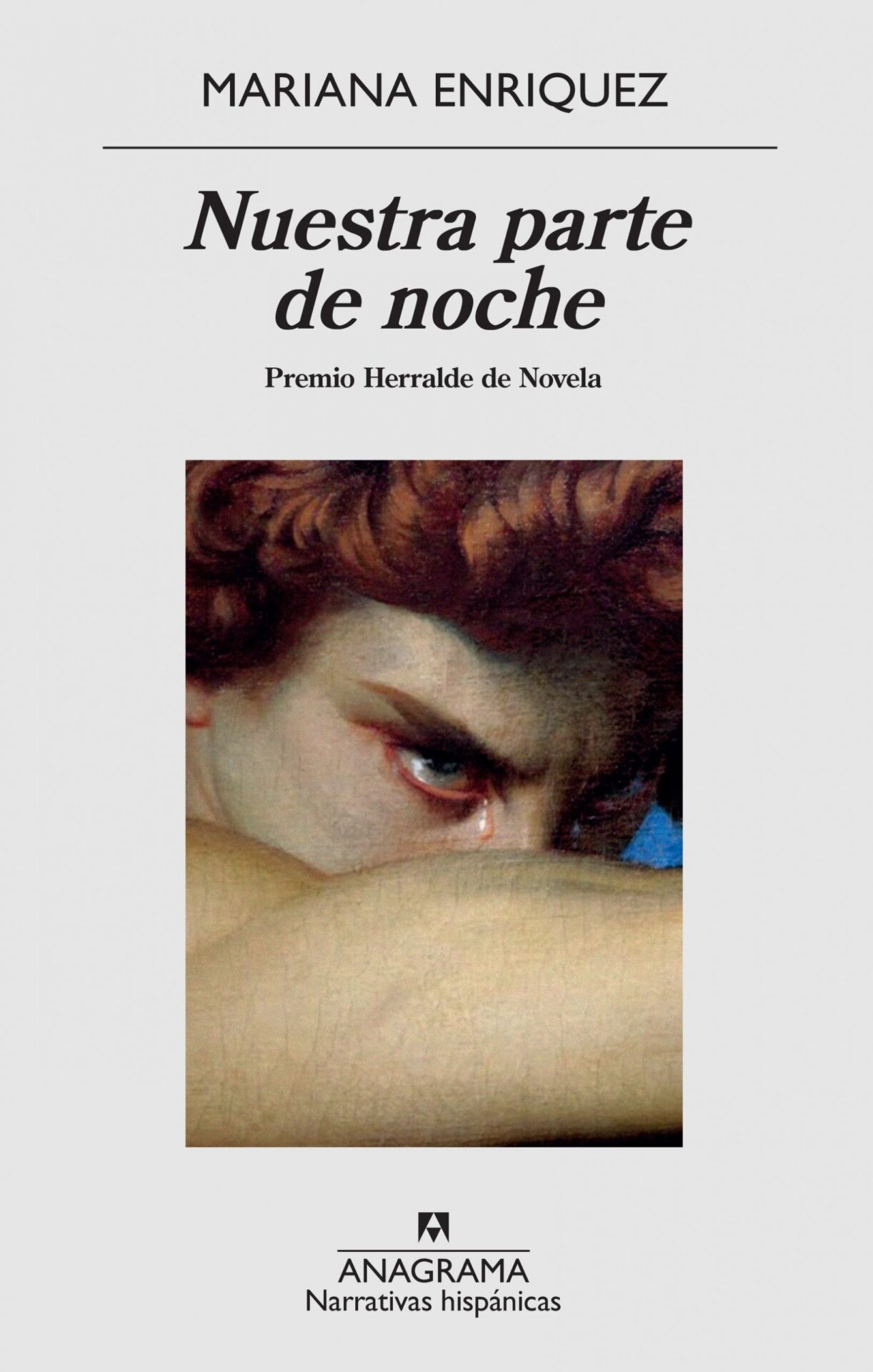 Mariana Enriquez has been awarded the Herralde Novel Award for Nuestra parte de noche, as it constitutes «a saga and a walk through the interior landscapes that we travel in our nightmares». The reader will find in these pages houses where the interior mutates; passageways that hide unimaginable monsters; rituals with fierce and ecstatic human sacrifices; in psychedelic London in the 1960s, where Gaspar’s mother met a young androgynous air singer named David; human eyelids turned into fetishes; enigmatic sexual liturgies; the relationship between parents and children, with the burden of an appalling inheritance; later, in the background, the repression of the military dictatorship, missing people and, in the end, the uncertain arrival of democracy.
Mariana Enriquez has been awarded the Herralde Novel Award for Nuestra parte de noche, as it constitutes «a saga and a walk through the interior landscapes that we travel in our nightmares». The reader will find in these pages houses where the interior mutates; passageways that hide unimaginable monsters; rituals with fierce and ecstatic human sacrifices; in psychedelic London in the 1960s, where Gaspar’s mother met a young androgynous air singer named David; human eyelids turned into fetishes; enigmatic sexual liturgies; the relationship between parents and children, with the burden of an appalling inheritance; later, in the background, the repression of the military dictatorship, missing people and, in the end, the uncertain arrival of democracy.
Fedosy Santaella: Tatuajes criminales rusos [Russian crime tattoos]
 Poetry, in a broad sense, translates as a way of knowing the world, and even living it, that starts from a certain simultaneous perception that goes beyond the taxis and the convention of the language. The poetic techné seeks to translate that experience and does so, paradoxically, inside the word. But in that eventually achieved framework, the words and the world have already been exchanged in another way and in another light. Written poetry is thus a kind of luminous drawing that seeks to translate the transformative experience of reading and poetic living, a tattoo that has been marked on the deeper skin.
Poetry, in a broad sense, translates as a way of knowing the world, and even living it, that starts from a certain simultaneous perception that goes beyond the taxis and the convention of the language. The poetic techné seeks to translate that experience and does so, paradoxically, inside the word. But in that eventually achieved framework, the words and the world have already been exchanged in another way and in another light. Written poetry is thus a kind of luminous drawing that seeks to translate the transformative experience of reading and poetic living, a tattoo that has been marked on the deeper skin.
María José Ferrada: Kramp
 When the first man arrives at the Moon, D begins working as a traveling seller of Kramp products: nails, sawdust, hammers, doorknobs and peepholes. He also begins the parallel education of his daughter, M. She became an assistant and accomplice, skipping classes behind her mother’s back to accompany D on his travels, discovering a precocious commercial sense and an unexpected talent for picaresque, as they tour the small towns of the Chilean south, a territory full of ghosts. Kramp, has been awarded prestigious Chilean literary recognitions: The Award for Best Novel of the Circle of Art Critics, the Award for the Best Works of the Ministry of Culture and the Municipal Prize of Literature of Santiago.
When the first man arrives at the Moon, D begins working as a traveling seller of Kramp products: nails, sawdust, hammers, doorknobs and peepholes. He also begins the parallel education of his daughter, M. She became an assistant and accomplice, skipping classes behind her mother’s back to accompany D on his travels, discovering a precocious commercial sense and an unexpected talent for picaresque, as they tour the small towns of the Chilean south, a territory full of ghosts. Kramp, has been awarded prestigious Chilean literary recognitions: The Award for Best Novel of the Circle of Art Critics, the Award for the Best Works of the Ministry of Culture and the Municipal Prize of Literature of Santiago.
Mateo García Elizondo: Una cita con la Lady [A date with the Lady]
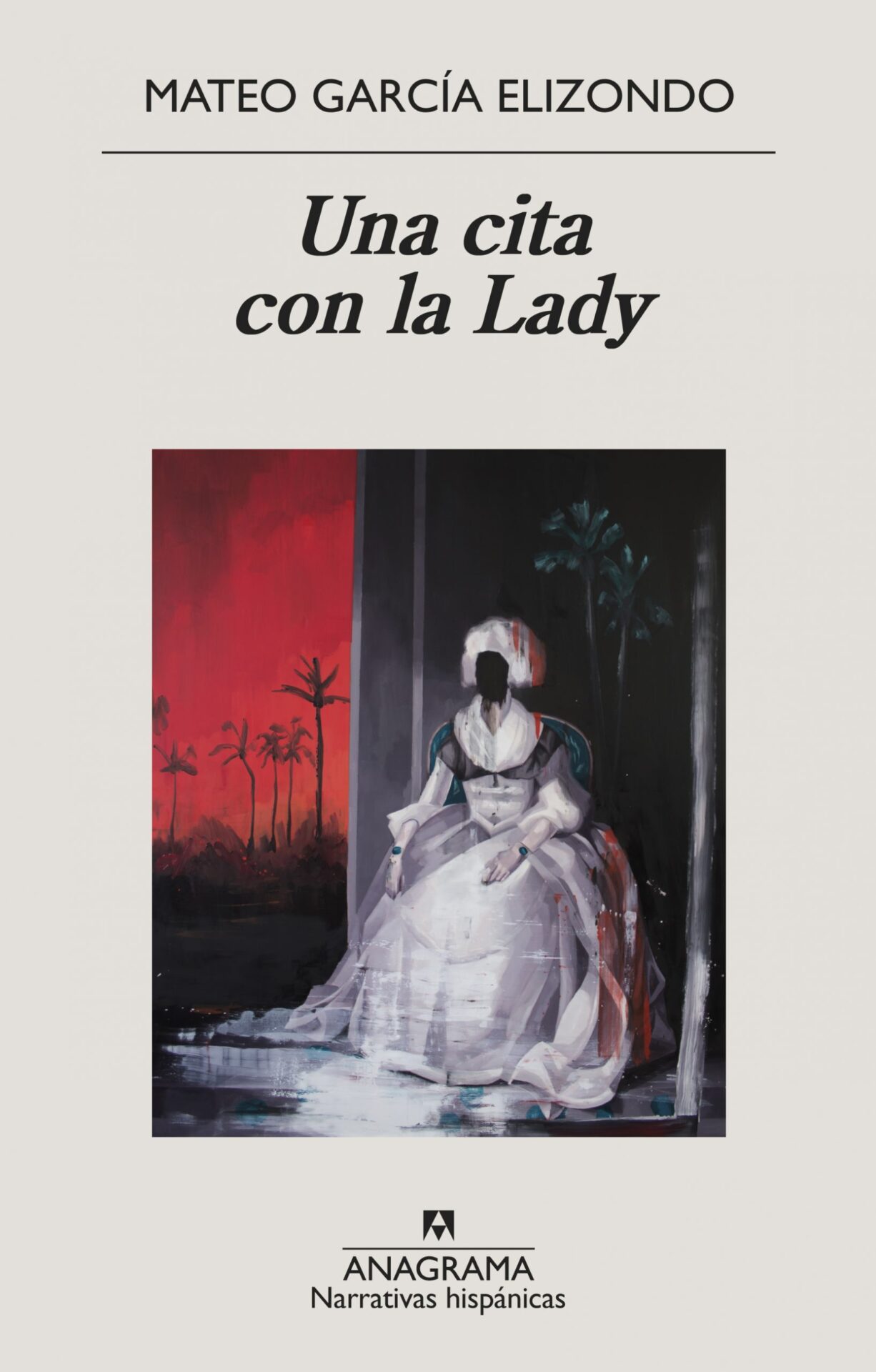 The first sentence of the novel evokes the mythical beginning of Pedro Páramo by Rulfo and in its pages, we can find echoes of the grotesque Mexican carnival of self-destruction of Under the Volcano by Malcolm Lowry. With an enveloping and hypnotic prose, Mateo García Elizondo narrates, in this astonishing and extraordinary debut, a journey to the heart of darkness, the spectral descent into the hell of an addict who goes on a path with a single possible destiny, which is increasingly near. For some writers, the novel is a version of Trainspotting in Comala, which explores the altered states of consciousness.
The first sentence of the novel evokes the mythical beginning of Pedro Páramo by Rulfo and in its pages, we can find echoes of the grotesque Mexican carnival of self-destruction of Under the Volcano by Malcolm Lowry. With an enveloping and hypnotic prose, Mateo García Elizondo narrates, in this astonishing and extraordinary debut, a journey to the heart of darkness, the spectral descent into the hell of an addict who goes on a path with a single possible destiny, which is increasingly near. For some writers, the novel is a version of Trainspotting in Comala, which explores the altered states of consciousness.
Natalia García Freire: Nuestra piel muerta [Our dead skin]
 Lucas enters to the dark underground world that has survived an invasion: the world of insects. Nuestra piel muerta explores that tiny place, more perfect than the human and more sacred than God, and for this it uses a pronounced lyrical tone and a structure that binds the memories of the protagonist with the present moment as if it were a web. Inside are questions and reflections on evil, disease, death and madness. Does life or the end of life is called decomposition? Where is the divine? Is the miracle rationality or alienation?
Lucas enters to the dark underground world that has survived an invasion: the world of insects. Nuestra piel muerta explores that tiny place, more perfect than the human and more sacred than God, and for this it uses a pronounced lyrical tone and a structure that binds the memories of the protagonist with the present moment as if it were a web. Inside are questions and reflections on evil, disease, death and madness. Does life or the end of life is called decomposition? Where is the divine? Is the miracle rationality or alienation?
Verónica Jaffé: De la metáfora, fluída [From the metaphor, fluid]
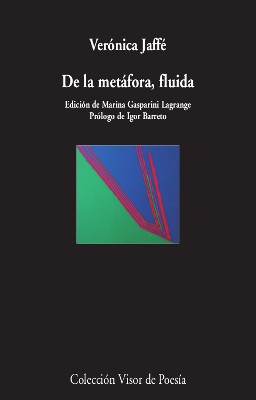 Veronica Jaffé is one of the most important voices in Venezuelan poetry. Her work, a decanted and essential word, translates losses and the necessary recognition of the personal into an intimate geography inhabited by memories and reflections that trace the emotional lines of the land of the poem. Her poetry is translation. Translate like see and hear, the own and the oblivious in the plot of metaphors that reveals a feeling of belonging to a place that is also a word. As Igor Barreto says, «Veronica Jaffe is a daimonic poet, because she owns an inner voice of natural wisdom, not prescriptive. It tells us what he thinks subtly, without raising the tone to the standard of supposed lessons».
Veronica Jaffé is one of the most important voices in Venezuelan poetry. Her work, a decanted and essential word, translates losses and the necessary recognition of the personal into an intimate geography inhabited by memories and reflections that trace the emotional lines of the land of the poem. Her poetry is translation. Translate like see and hear, the own and the oblivious in the plot of metaphors that reveals a feeling of belonging to a place that is also a word. As Igor Barreto says, «Veronica Jaffe is a daimonic poet, because she owns an inner voice of natural wisdom, not prescriptive. It tells us what he thinks subtly, without raising the tone to the standard of supposed lessons».
Melba Escobar: La mujer que hablaba sola [The woman who speaks alone]
 Melba Escobar has traced, in his two previous novels, the ominous reality of a Colombia fractured by violence and classism, by the ideological radicalisms and deep inequities of a nation that has remained at war for seventy years. The voice of the protagonist confronts us and reminds us that we are all contradictory beings and that, lots of times, we fall into the trap of making judgments that border on fanaticism. In an unbridled dialogue with her ghosts, the decisions she made in her youth are questioned, as well as the motives that pushed her into motherhood while questioning the reader: Is anyone innocent in this country where everyone claims to have the truth?
Melba Escobar has traced, in his two previous novels, the ominous reality of a Colombia fractured by violence and classism, by the ideological radicalisms and deep inequities of a nation that has remained at war for seventy years. The voice of the protagonist confronts us and reminds us that we are all contradictory beings and that, lots of times, we fall into the trap of making judgments that border on fanaticism. In an unbridled dialogue with her ghosts, the decisions she made in her youth are questioned, as well as the motives that pushed her into motherhood while questioning the reader: Is anyone innocent in this country where everyone claims to have the truth?
Alejandro Morellón: Caballo sea la noche [Horse be the night]
 Caballo sea la noche narrates the crumbling of a family, when the past and the present become delirium, crazed voice, urgent need to escape or rebuild the few remains that remain. This novel is the beginning of that reconstruction, that decisive moment when the survivors of the catastrophe seek redemption, liberation and re-establish their ties with the world. After his last book of short stories, recognized with the IV Hispano-American Prize Gabriel García Márquez, Morellón write this novel as a text of poetic prose, unbridled and reflective, in which we do not know if the night will be prolonged or if the light will finally reveal those secrets painful that shape the truth.
Caballo sea la noche narrates the crumbling of a family, when the past and the present become delirium, crazed voice, urgent need to escape or rebuild the few remains that remain. This novel is the beginning of that reconstruction, that decisive moment when the survivors of the catastrophe seek redemption, liberation and re-establish their ties with the world. After his last book of short stories, recognized with the IV Hispano-American Prize Gabriel García Márquez, Morellón write this novel as a text of poetic prose, unbridled and reflective, in which we do not know if the night will be prolonged or if the light will finally reveal those secrets painful that shape the truth.
Victoria de Stefano: Su vida [Her life]
 Victoria de Stefano tells us her life. As Alberto Hernández points out, «that nutrient existence that continues to travel from her memory, from her writing, from all the breaths that she accumulates to trace the drawing of her transit through the earth, through that land, still round but that one day seemed an abyss as she sailed from her native Italy to the American continent». Here, the woman is a character who gives her life to the reader, where all the details of her arrival in Venezuela, from her native Rimini, lead her to walk the path of the existence of an exemplary writer.
Victoria de Stefano tells us her life. As Alberto Hernández points out, «that nutrient existence that continues to travel from her memory, from her writing, from all the breaths that she accumulates to trace the drawing of her transit through the earth, through that land, still round but that one day seemed an abyss as she sailed from her native Italy to the American continent». Here, the woman is a character who gives her life to the reader, where all the details of her arrival in Venezuela, from her native Rimini, lead her to walk the path of the existence of an exemplary writer.
John Templanza Better: Limbo
 Limbo is John Temperance Better’s new novel, where a horror story set in the Caribbean approaches a new and dynamic genre in its narrative. As the writer points out, the novel «It’s a horror that breathes, not so much gore or bloody. A horror of the spaces, of the corners, of what moves under the table and we do not realize it» As a barranquillero, journalist and writer (or «queerwriter») Better returns to his pages with the same power as the marked and deep tombstones of that abyss where his vigorous words are inserted.
Limbo is John Temperance Better’s new novel, where a horror story set in the Caribbean approaches a new and dynamic genre in its narrative. As the writer points out, the novel «It’s a horror that breathes, not so much gore or bloody. A horror of the spaces, of the corners, of what moves under the table and we do not realize it» As a barranquillero, journalist and writer (or «queerwriter») Better returns to his pages with the same power as the marked and deep tombstones of that abyss where his vigorous words are inserted.
Araceli Tinajero: Kokoro: A Mexican Woman in Japan
 A Mexican young woman goes to Japan in the early 80s. She settles in the country, not knowing Japanese or much about Japanese culture, but eager to absorb both. This she does gradually, in touch with ordinary people who take an interest in her. Years later, having become a professor of Latin American literature in the U.S., and an interpreter of the Japanese language, she will reminisce about her early experiences in Japan and the process by which she came to love the country. This is the story told in this book: the transformation of a young woman through immersion in a foreign civilization that will become her own intellectually and spiritually. It is the tale of Japan in the heart: Kokoro.
A Mexican young woman goes to Japan in the early 80s. She settles in the country, not knowing Japanese or much about Japanese culture, but eager to absorb both. This she does gradually, in touch with ordinary people who take an interest in her. Years later, having become a professor of Latin American literature in the U.S., and an interpreter of the Japanese language, she will reminisce about her early experiences in Japan and the process by which she came to love the country. This is the story told in this book: the transformation of a young woman through immersion in a foreign civilization that will become her own intellectually and spiritually. It is the tale of Japan in the heart: Kokoro.
Alberto Torres Blandina: Después de nunca [After never]
 Reality lost its consistency and now we inhabit a new scenario in which we live with stories that seem to emerge from a sick mind: ancient legends are corporatized, people who are reborn, duplicate or disappear, objects that come to life, young people who become mutants. Along with his two previous novels, Contra los lobos (2016) and Con el frío (2015), a thematic trilogy is formed that gives account of the times in which we live: fear as a form of control, the captivated creation of reality, the silent war or the complexity of a fully connected world, with an incapable of effective communication.
Reality lost its consistency and now we inhabit a new scenario in which we live with stories that seem to emerge from a sick mind: ancient legends are corporatized, people who are reborn, duplicate or disappear, objects that come to life, young people who become mutants. Along with his two previous novels, Contra los lobos (2016) and Con el frío (2015), a thematic trilogy is formed that gives account of the times in which we live: fear as a form of control, the captivated creation of reality, the silent war or the complexity of a fully connected world, with an incapable of effective communication.
José Urriola: Fisuras [Fissures]
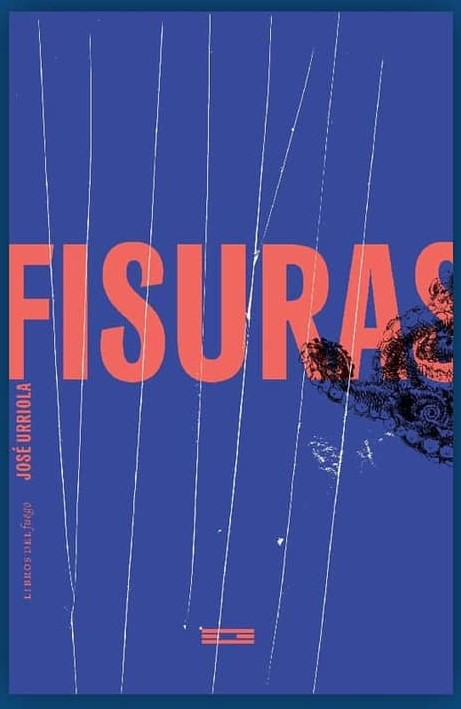 «As soon as we come to this world, pieces of us begin to fall». With this quote by Gustave Flaubert begins the novel that tells the story of Pablo, the protagonist who remains always there, while his brother Santiago leaves. Always thinking like the younger brother, Pablo sends his messages to infinity, as if they were moving in the bottles that eventually approach the island. In Iceland, Santiago receives those words that Pablo sometimes swallowed to establish a distant complicity with his brother. Santiago, the absent, and Pablo, the silent. «You’re the one who’s leaving, and I’m the one who stays. You run away and I lock myself up».
«As soon as we come to this world, pieces of us begin to fall». With this quote by Gustave Flaubert begins the novel that tells the story of Pablo, the protagonist who remains always there, while his brother Santiago leaves. Always thinking like the younger brother, Pablo sends his messages to infinity, as if they were moving in the bottles that eventually approach the island. In Iceland, Santiago receives those words that Pablo sometimes swallowed to establish a distant complicity with his brother. Santiago, the absent, and Pablo, the silent. «You’re the one who’s leaving, and I’m the one who stays. You run away and I lock myself up».
Juvencio Valle: El viejo lenguaje de las hojas [The old language of leaves]
 This book by Juvencio Valle, a poet born in Southern Chile, has an obvious vital spirit, portraying the life of natural Chile (with special emphasis on trees, plants, animals and people from rural areas), and the search for the beauty of the spirit and the Landscape. This anthology is an act of literary justice, preventing such a powerful poetic voice from moving further away over time from the reading public.
This book by Juvencio Valle, a poet born in Southern Chile, has an obvious vital spirit, portraying the life of natural Chile (with special emphasis on trees, plants, animals and people from rural areas), and the search for the beauty of the spirit and the Landscape. This anthology is an act of literary justice, preventing such a powerful poetic voice from moving further away over time from the reading public.
Hernán Vanoli: El amor por la literatura en tiempos de algoritmos [The love of literature in the time of algorithms]
 What happened to the committed writer and what used to be called the social function of literature? What about the avant-garde writer, engrossed in experimentation with words and in tension with the market? In a world hegemonized by data extraction corporations, with a public sphere trodden by poor political discourses that at most state good intentions, what are the possibilities of literature if it does not want to become a ritual anachronistic of the world’s flight? In eleven powerful hypotheses, Hernán Vanoli seeks to understand the conditions of production and cultural circulation today, freeing himself from technological euphoria and nostalgia from a literary field that may never have existed.
What happened to the committed writer and what used to be called the social function of literature? What about the avant-garde writer, engrossed in experimentation with words and in tension with the market? In a world hegemonized by data extraction corporations, with a public sphere trodden by poor political discourses that at most state good intentions, what are the possibilities of literature if it does not want to become a ritual anachronistic of the world’s flight? In eleven powerful hypotheses, Hernán Vanoli seeks to understand the conditions of production and cultural circulation today, freeing himself from technological euphoria and nostalgia from a literary field that may never have existed.
Mario Vargas Llosa: Tiempos recios [Fierce times]
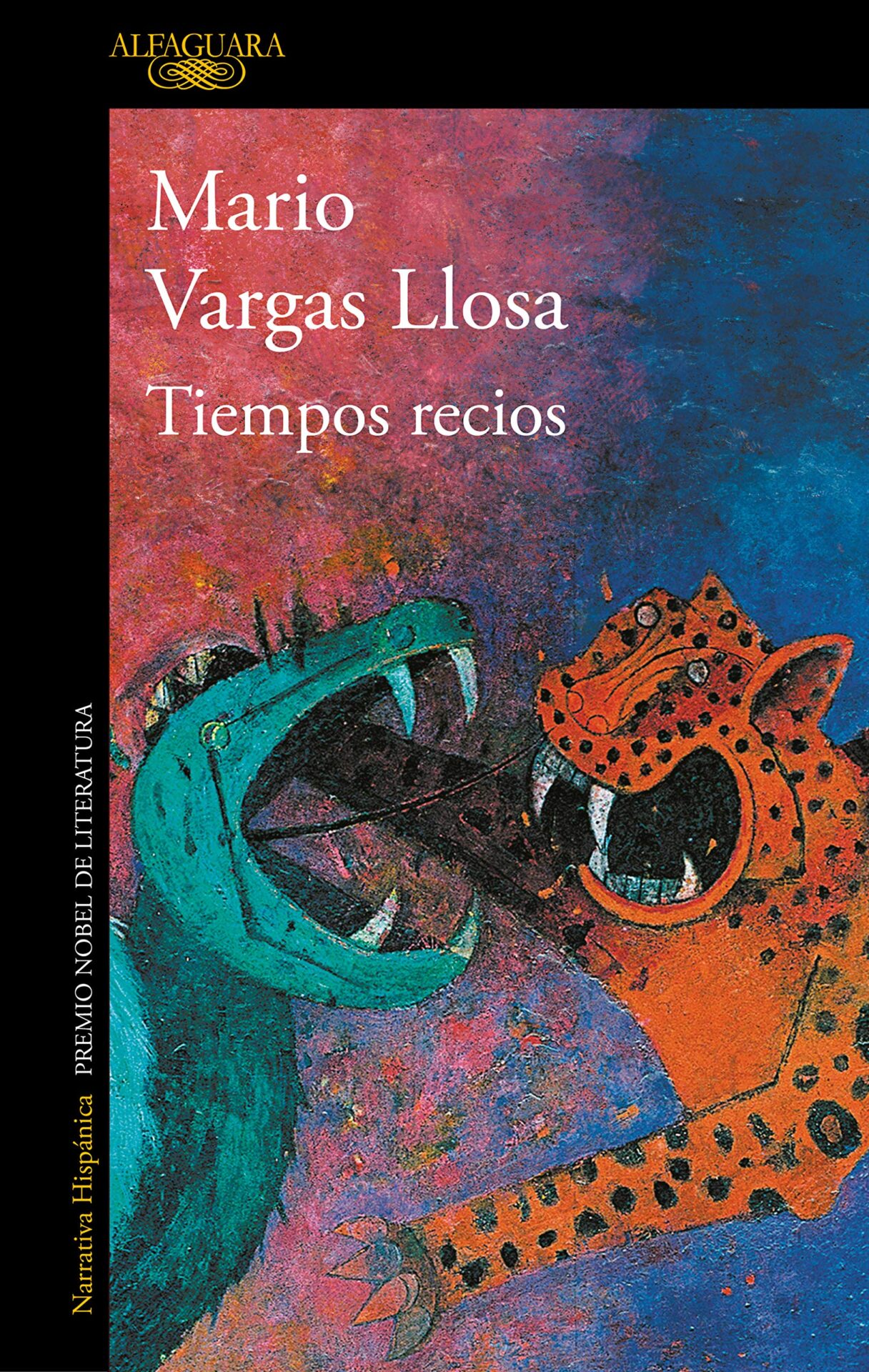 Tiempos recios is a story of international conspiracies and conflicting interests in the time of the Cold War, the echoes of which are still felt today. A story involving several countries, in which some persecutors end up as victims of the very plot they helped construct. In this thrilling novel, which is connected to the acclaimed La Fiesta del Chivo [The Feast of the Goat], Mario Vargas Llosa fuses reality with two fictions: that of the narrator who freely recreates characters and situations, and the one designed by those who would control the politics and the economy of a continent by manipulating its history.
Tiempos recios is a story of international conspiracies and conflicting interests in the time of the Cold War, the echoes of which are still felt today. A story involving several countries, in which some persecutors end up as victims of the very plot they helped construct. In this thrilling novel, which is connected to the acclaimed La Fiesta del Chivo [The Feast of the Goat], Mario Vargas Llosa fuses reality with two fictions: that of the narrator who freely recreates characters and situations, and the one designed by those who would control the politics and the economy of a continent by manipulating its history.
Juan Gabriel Vásquez: Canciones para el incendio [Songs for the fire]
 A new book of tales by the winner of the IMPAC Prize and the Alfaguara Novel Prize for The Sound of Things Falling. «One of the most original voices in new Latin American literature»—Mario Vargas Llosa. A photographer understands something she would have preferred not to. A veteran of the Korean War faces his past during a seemingly benign encounter. After the discovery of a book from 1887, a writer ends up discovering the life of a fascinating woman. The characters in Songs for the Fire are men and women touched by violence, whether first-hand or only tangentially, whose lives change forever because of a chance encounter or unimaginable forces.
A new book of tales by the winner of the IMPAC Prize and the Alfaguara Novel Prize for The Sound of Things Falling. «One of the most original voices in new Latin American literature»—Mario Vargas Llosa. A photographer understands something she would have preferred not to. A veteran of the Korean War faces his past during a seemingly benign encounter. After the discovery of a book from 1887, a writer ends up discovering the life of a fascinating woman. The characters in Songs for the Fire are men and women touched by violence, whether first-hand or only tangentially, whose lives change forever because of a chance encounter or unimaginable forces.
María Negroni et al.: Carne de mi carne [Flesh of my flesh]
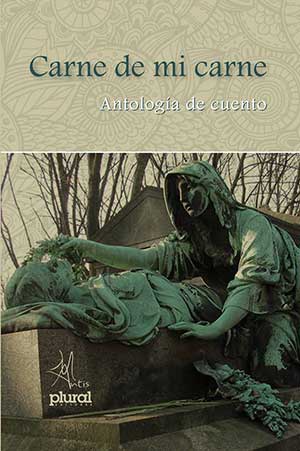 The organs, skins and tissues from which these thirteen powerful scriptures are stripped, not without pain, not without pleasure, to knead and stitch the monster: Margo Glantz (the voice), María Fernanda Ampuero (the genitals), Betina González (the spine), Daniela Tarazona (the left eye), Lena Lau (the liver), Fabiola Morales (the heel), Fernanda García Lao (the heart), Claudia Hernandez (the ear), Katya Adaui (the hand) Rosario Barahona (the right brain hemisphere), María José Navia (the large intestine). And because the real monstrosity is also “queer”, Mantis created a stomach for a Colombian writer, Giuseppe Caputo. Maria Negroni complete this scenario of dark waters and frozen seas, with an essay about Frankenstein.
The organs, skins and tissues from which these thirteen powerful scriptures are stripped, not without pain, not without pleasure, to knead and stitch the monster: Margo Glantz (the voice), María Fernanda Ampuero (the genitals), Betina González (the spine), Daniela Tarazona (the left eye), Lena Lau (the liver), Fabiola Morales (the heel), Fernanda García Lao (the heart), Claudia Hernandez (the ear), Katya Adaui (the hand) Rosario Barahona (the right brain hemisphere), María José Navia (the large intestine). And because the real monstrosity is also “queer”, Mantis created a stomach for a Colombian writer, Giuseppe Caputo. Maria Negroni complete this scenario of dark waters and frozen seas, with an essay about Frankenstein.
Yuri Herrera: Diez Planetas [Ten planets]
 Here the characters inhabit an unimaginable future: an exiled earthling in an unlikely corner of the galaxy makes a discovery that forces it to rethink its species categories; an minimal bacterium becomes inside a human colon by the random effect of a lysergic drug; a cosmonaut unravels a clear map of the world through the almost imperceptible signs of a nose. Diez Planetas is a science fiction book and a small collection of philosophical short stories «illustrated» in the tradition that connect Ursula K. Le Guin and Philip K. Dick with Jonathan Swift and Voltaire. And Borges, and Kafka. A subtle dialogue with teachers from the most innovative literature, where «legends create truth, no matter how lying they are ».
Here the characters inhabit an unimaginable future: an exiled earthling in an unlikely corner of the galaxy makes a discovery that forces it to rethink its species categories; an minimal bacterium becomes inside a human colon by the random effect of a lysergic drug; a cosmonaut unravels a clear map of the world through the almost imperceptible signs of a nose. Diez Planetas is a science fiction book and a small collection of philosophical short stories «illustrated» in the tradition that connect Ursula K. Le Guin and Philip K. Dick with Jonathan Swift and Voltaire. And Borges, and Kafka. A subtle dialogue with teachers from the most innovative literature, where «legends create truth, no matter how lying they are ».
Lorena Huitrón Vázquez: El oficio del escarabajo [The trade of the scarab]
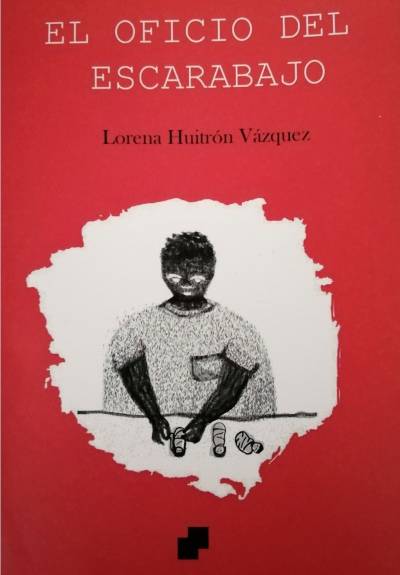 The latest offering from Mexican poet Lorena Huitrón Vázquez represents the ninth book in the collection Oficios de la noche [Trades of the night], published by Ediciones El Humo. The book features intimate portraits of family life at times of mourning, along with philosophical observations on life and death, all bound together through the innovative and experimental poetic language that characterizes this writer’s work. Like her previous verse collections, El oficio del escarabajo tests the boundaries between poetry and philosophy, revealing truths along the way that are often harsh and beautiful at the same time.
The latest offering from Mexican poet Lorena Huitrón Vázquez represents the ninth book in the collection Oficios de la noche [Trades of the night], published by Ediciones El Humo. The book features intimate portraits of family life at times of mourning, along with philosophical observations on life and death, all bound together through the innovative and experimental poetic language that characterizes this writer’s work. Like her previous verse collections, El oficio del escarabajo tests the boundaries between poetry and philosophy, revealing truths along the way that are often harsh and beautiful at the same time.
Compiled by Claudia Cavallín
Revised by Michael Redzich


